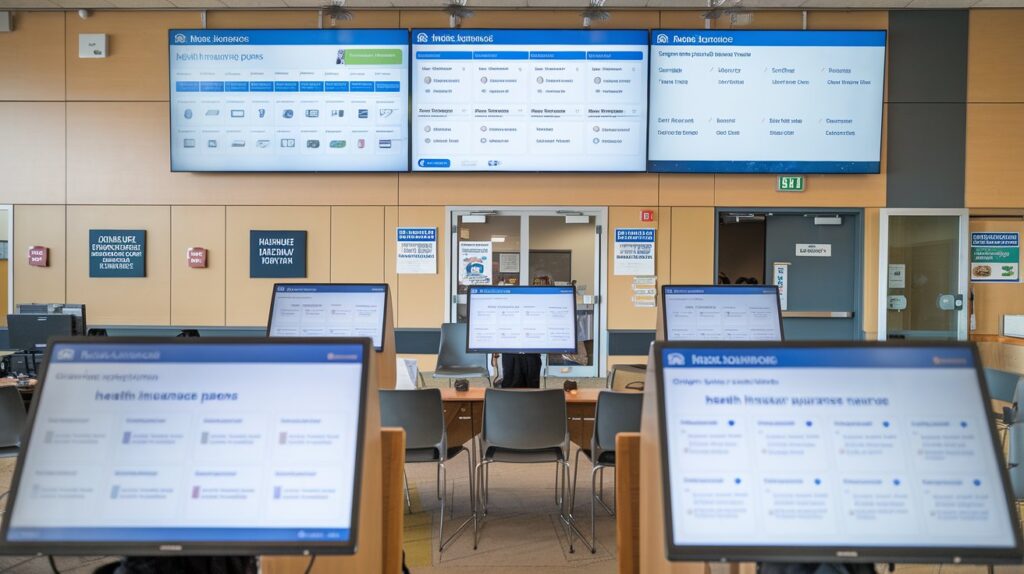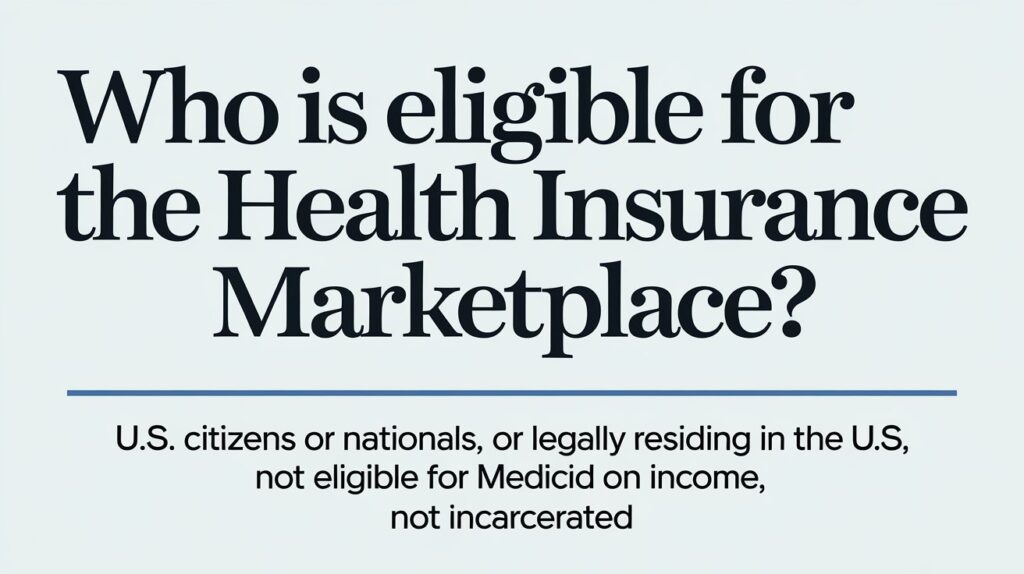
What is the Health Insurance Marketplace?
The health insurance marketplace is a platform where individuals and families can shop for, compare, and purchase health insurance plans. This marketplace is designed to offer affordable health insurance options to those who are not covered by their employer or through government programs like Medicare or Medicaid. Managed by either state or federal governments, the marketplace gives people the opportunity to access a wide range of insurance plans that fit their needs and budget.
How Does the Health Insurance Marketplace Work?
Navigating the health insurance marketplace is simpler than you think. The process typically involves four main steps, which ensure that you find the right plan for your health and financial situation.

- Create an Account
- To start using the marketplace, you’ll first need to create an account. This is where you’ll input your basic information, like your name, age, and where you live. This step ensures the marketplace shows plans available in your region.
- Provide Personal Information
- Once your account is set up, you’ll be required to provide specific information about yourself, your family, and your income. The details help the marketplace determine whether you qualify for subsidies or tax credits that can lower the cost of your premiums.
- Compare Plans
- The marketplace offers a variety of plans to suit different needs and budgets. You can compare these plans based on key factors such as premium costs, deductibles, co-pays, and overall coverage. This helps you choose the plan that best matches your health needs and financial capacity.
- Enroll in a Plan
- After you’ve found the plan that fits you best, you can complete the enrollment process. From that point, you’ll start receiving health coverage as outlined in your chosen insurance plan.
Also Read: Gut Health
Who is Eligible for the Health Insurance Marketplace?
The health insurance marketplace is available to most U.S. citizens and legal residents who do not have access to affordable health coverage through their employer or government programs like Medicare or Medicaid. In general, if your employer does not provide affordable coverage, or if you are self-employed or unemployed, you may be eligible to purchase health insurance through the marketplace.

What Types of Plans are Offered on the Health Insurance Marketplace?
The health insurance marketplace provides several plan types to accommodate different preferences and healthcare needs. Each type comes with varying degrees of flexibility, network access, and cost-sharing options:
- Health Maintenance Organization (HMO) Plans
- HMO plans generally have lower premiums but require you to use a specific network of doctors and hospitals. These plans also require a referral from your primary care doctor to see a specialist. They are great for people who want lower costs and don’t mind some restrictions.
- Preferred Provider Organization (PPO) Plans
- PPO plans offer more flexibility than HMOs. You can see both in-network and out-of-network providers, although you’ll pay less for in-network services. PPOs typically have higher premiums but are a good option for those who want more freedom in choosing healthcare providers.
- Exclusive Provider Organization (EPO) Plans
- EPO plans are a middle ground between HMOs and PPOs. They offer lower costs but require you to use a specific network of doctors. Unlike HMOs, you do not need referrals to see specialists, but out-of-network care is generally not covered.
- Health Savings Account (HSA)-Eligible Plans
- These high-deductible health plans allow you to save money in a tax-advantaged Health Savings Account. The savings can be used for qualifying medical expenses, offering a way to manage healthcare costs while enjoying tax benefits.

Financial Help Available on the Health Insurance Marketplace
One of the most attractive features of the health insurance marketplace is the financial assistance offered to help lower-income individuals and families afford coverage. There are two main forms of financial help:
- Premium Tax Credits
- These tax credits can significantly reduce the amount you pay in monthly premiums. If you qualify, the credit is applied directly to your premium, making your health insurance more affordable.
- Cost-Sharing Reductions (CSRs)
- CSRs lower the amount you have to pay out-of-pocket for deductibles, co-pays, and coinsurance. This additional financial assistance is available to those with lower income levels and is automatically applied to qualifying health plans.

The Importance of the Health Insurance Marketplace
The health insurance marketplace plays a critical role in ensuring that millions of Americans have access to affordable healthcare. Before its establishment, many individuals without employer-provided insurance faced high premiums or were denied coverage due to pre-existing conditions. The marketplace offers a solution to these problems, providing a wide range of insurance options with government-backed financial assistance. It ensures that health insurance is accessible to more people, helping them avoid catastrophic medical costs.
How Can You Benefit from the Health Insurance Marketplace?
If you’re self-employed, in between jobs, or your employer does not offer adequate health coverage, the health insurance marketplace is a resource that can protect your health and finances. Additionally, if you’re not satisfied with your current health plan, the marketplace provides an opportunity to shop around for better options.
By comparing different plans, you can choose one that offers comprehensive coverage at a price that works for your budget. Whether you need basic health services or more specialized care, the marketplace ensures you’re covered.

When Can You Enroll in the Health Insurance Marketplace?
Open enrollment is the period each year when you can sign up for a health plan through the marketplace. It usually runs from November to December, though specific dates can vary. Outside of open enrollment, you can only sign up if you qualify for a Special Enrollment Period due to life events like marriage, birth of a child, or loss of other health coverage.
The Future of the Health Insurance Marketplace
As healthcare continues to evolve, the health insurance marketplace will likely play an even larger role in providing access to affordable coverage. With potential expansions in subsidies and improvements in plan offerings, more Americans may turn to the marketplace as their primary resource for health insurance.
Conclusion
The health insurance marketplace is a valuable resource for those looking for affordable, flexible, and comprehensive health insurance plans. By offering various options and financial assistance, the marketplace has transformed the way Americans access healthcare. Whether you’re shopping for a new plan or seeking coverage for the first time, the marketplace makes it easy to compare and choose a plan that fits your needs.
